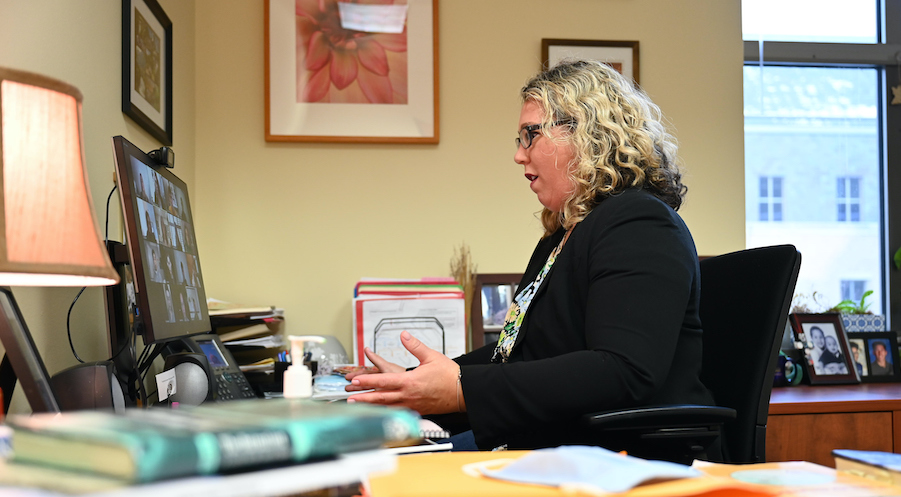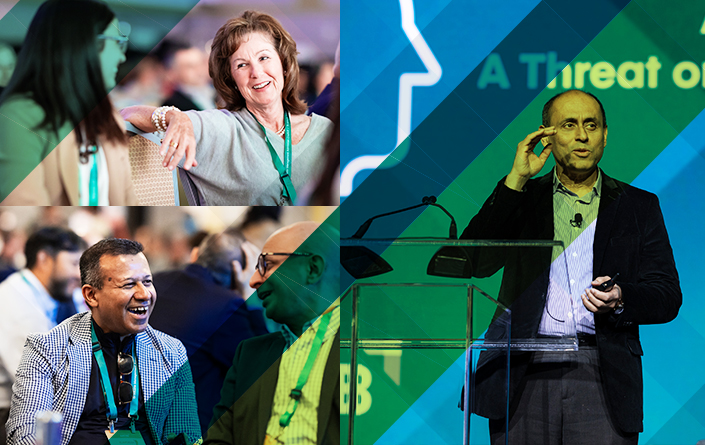Ethical Reset: A Sustainable Recovery
Advocating for the principles of sustainable business was complex even before a pandemic upended companies and communities around the world. Teaching these principles has become even more urgent during our current global crisis.
At the University of Notre Dame’s Mendoza College of Business in Indiana, we have long aimed to make the realities of ethical business accessible and compelling to students, both in dedicated classes and in assignments within other courses. Since 2008, I have taught our required undergraduate course in business ethics, covering principles of philosophical and behavioral ethics that are highly relevant to sustainability.
As I see it, business schools have three important roles during a global crisis like the coronavirus pandemic. First, we must equip future decision makers with competencies and sensibilities informed by ethical considerations. Second, we must produce the research, data, and analytics that will help inform practice and policy. And third, we must convene diverse groups of stakeholders to work collaboratively toward solutions to today’s grand challenges.
The First Responsibility: Teaching Future Leaders
In any class that focuses on ethical business, we can discuss specific strategies such as increasing transparency, enhancing employee voices, engaging with diverse stakeholders, defining purpose and mission, and fostering respect and inclusion.
During a crisis like the pandemic, it is critical that we help the next generation appreciate and apply socially and environmentally sustainable business practices. We can do this by showing students how to leading amidst uncertainty, build sustainable supply chains, and ensure worker safety in environments where simply showing up can mean exposure to a deadly illness. We can acknowledge that the virus is exacerbating inequalities—both among and within countries. In addition, we can explore how its catastrophic effects reflect our interdependence both with each other and with the natural world.

Jessica McManus Warnell teaches a virtual course during the winter session at the Notre Dame Mendoza College of Business.
Another fruitful topic to cover in challenging times is personal, organizational, and community resilience. While we typically define resilience as the ability to recover from crisis or adversity, it can be an elusive concept that is difficult to quantify. Do we define resilience as thriving? Or merely surviving? The concept also can be problematic if we’re dealing with situations like racial injustice. Focusing only on individual resilience without considering structural inequities that create unnecessary obstacles for marginalized groups could absolve those in power from any responsibility.
One of the best ways to cover resilience—and the other complex concepts related to sustainable business—is through multidisciplinary courses. These offerings help students understand that challenges like pandemics, climate change, and global inequality demand collaborative responses.
A Case Study on Teaching About a Crisis
At Notre Dame, a recent project brought together a team of professors from the liberal arts and sciences (Noriko Hanabusa and Anna Geltzer), engineering (Kevin Walsh), and management and organization (me). It built on research I had done with colleagues in Japan, primarily Toru Umeda of Reitaku University, as well as experiences I had had over several years of taking students to Tokyo for a course on Japanese business and culture. When we designed the project a year ago, we incorporated a student research component that explored economic and community recovery in the wake of disasters.
Our initial focus was the 2011 Fukushima earthquake, tsunami, and nuclear tragedy. In that situation, a natural disaster was exponentially magnified by problematic business practices and inadequate government oversight.
Our faculty team traveled to Fukushima early in 2019 to lay the groundwork for the project. We subsequently had to postpone our planned 2020 summer trip because of the pandemic, but our student-faculty team continues to meet virtually to explore topics related to the tragedy. These include crisis management, business responses to disasters, institutional and international partnerships, infrastructure performance, renewable energy, and the metrics of economic and community resilience.
We also are studying questions such as when and where to shut down normal operations in a crisis. For instance, at Fukushima, fear of radiation exposure led to mass evacuations. But we have learned that without accurate data on the consequences of staying put, relocation can sometimes be the more problematic alternative. Today, tens of thousands of people remain displaced from Fukushima.
Other topics have become sharply relevant during the pandemic: how to prioritize responses during a crisis, how to manage competing data sources, and how to navigate inconsistent messaging from leaders.
Another lesson we are learning from the course is the power of resilience. During our faculty trip to Fukushima in 2019, we encountered heartbreaking sights. We saw an empty school with desks, books, backpacks, pencils, and artwork still exactly where children left them in the rush to evacuate. We observed vacant homes and businesses being reclaimed by wandering vines while trees sprouted through the flooring.
In contrast, in communities that have reopened, we saw perseverance and commitment. We found an inn and a restaurant that have been opened by young couples, and we visited a solar farm built on reclaimed land. At a huge seaside port where buildings had been flattened by the tsunami, we encountered scores of people building smarter and safer buildings. (For more insights into what we can learn from these businesses, read Harvard University’s Working Knowledge article published June 2020, “Why Japanese Companies are So Good at Surviving Crises.”)
Other topics we’re studying in class have become sharply relevant during the current pandemic: how to prioritize responses during a crisis, how to manage competing data sources, and how to navigate inconsistent messaging from leaders. As the coronavirus has raged, we’ve seen national leaders conducting stark cost-benefit analyses of economic shutdowns. We’ve also witnessed the devastating consequences when they provide erratic or irresponsible messaging and when they fail to consider empirical data when making policy decisions.
Events like the Fukushima tragedy and the COVID-19 pandemic make it clear that communities around the globe are facing massive challenges to well-being and equitable prosperity. It is the work of educators to bring these realities to life for students by providing them with the frameworks to make sense of tough situations—and the skills to find solutions.
The Second Role: Producing Reliable Data
For schools that teach responsible business, a second key task is to gather and share data about how businesses manage during acute challenges. And the evidence tells us that companies that prioritize ethical strategies fare better in times of crisis.
For instance, new research indicates that during an emergency, investors evaluate the way a company responds to its stakeholders. In this study, Harvard researchers looked at 3,000 of the world’s largest publicly held companies. They found that about 25 percent met their study's criteria for resilience, as defined by how they treated employees, dealt with suppliers, and met crisis-related customer needs.
The pandemic has sent many companies into a forced reset. Fortune 500 CEOs surveyed in April 2020 said they believe it will be years before the U.S. economy recovers from the pandemic; the majority expect technological transformation will be accelerated at their companies. Since they are already pouring significant time and resources into managing their pandemic responses, why not take this opportunity to pivot toward creating a more equitable society? And business schools can help them make that switch.
For example, many companies will continue to rely on international supply chains after the pandemic, so faculty researchers can compile data showing the advantages of making these supply chains sustainable. Business leaders can incorporate new strategies such as making better plans for contingencies, enhancing transparency, and improving stakeholder engagement. These strategies don’t have to be costly—but they do enable companies to conduct business more ethically.
While the crisis has allowed businesses to display incredible innovation and strength, it also has exposed their fault lines.
When scholars produce critical contributions related to doing business well, their work can be used to inform practice and policy. Initiatives such as the Responsible Research in Business and Management (RRBM) network advocate for research with positive impact on the lives of people and societies. For instance, RRBM offers resources that provide guidance on managing through COVID-19.
Not only can business schools produce relevant research, they can partner with corporations to help them become more sustainable. As an example, a recent article in Forbes magazine describes the United Nations’ Sustainable Development Goals (SDGs) as a “hack” for business—a blueprint for aligning business strategy with purpose. Business schools can provide data that backs up the impact of each SDG.
But companies also can partner with universities that put these issues at the forefront. For instance, the Notre Dame Deloitte Center for Ethical Leadership provides research and practice briefings for companies. More than 800 business schools have signed on to the U.N.’s Principles for Responsible Management Education (PRME), and many are taking specific actions toward scholarship and teaching that reflects the SDGs. Groups such as the Aspen Institute’s Business and Society Program have compiled resources for educators with the goal of helping to shape future leaders who are committed to social and environmental sustainability.
The executive director of the Global Compact called the COVID-19 crisis a “fire drill” for future climate and social justice emergencies. These crises can bring out the worst of human nature, but also the best. If organizations can work with researchers to learn how to lean on ethical values to navigate challenges, they can work toward becoming the types of organizations they want to be.
Our Final Responsibilities: Convening and Rethinking
The third role for academia during this challenging time is to convene diverse stakeholders to learn from one another through civil discourse. Such conversations can guide our collective responses to global challenges. This thoughtful and sorely needed dialogue can be carried out online until we can once again be together in person. For two examples, the Notre Dame Liu Institute for Asia and Asian Studies hosts events exploring topics such as sustainable business in the age of coronavirus, and the Mendoza College of Business presents speaker series on topics ranging from empathy and ethical business to student voices on racial injustice.
The pandemic has offered businesses a chance to rethink their role in society. While the crisis has allowed them to display incredible innovation and strength, it also has exposed their fault lines. Unless business leaders make changes, they run the risk of being in the same position—or a worse one—when the next disaster hits.
As business schools, our role is clear: Through teaching, research, and stakeholder engagement, we can help businesses find their purpose, articulate their values, test innovative models, develop practices that improve the well-being of people and communities, and contribute to equitable prosperity. For universities, companies, and communities, the stakes are too high for us to pursue goals that are any less ambitious.
McManus Warnell the author of Engaging Millennials for Ethical Leadership. A portion of this article was presented at an event sponsored by the Notre Dame Liu Institute for Asia and Asian Studies and Notre Dame International in July 2020.






